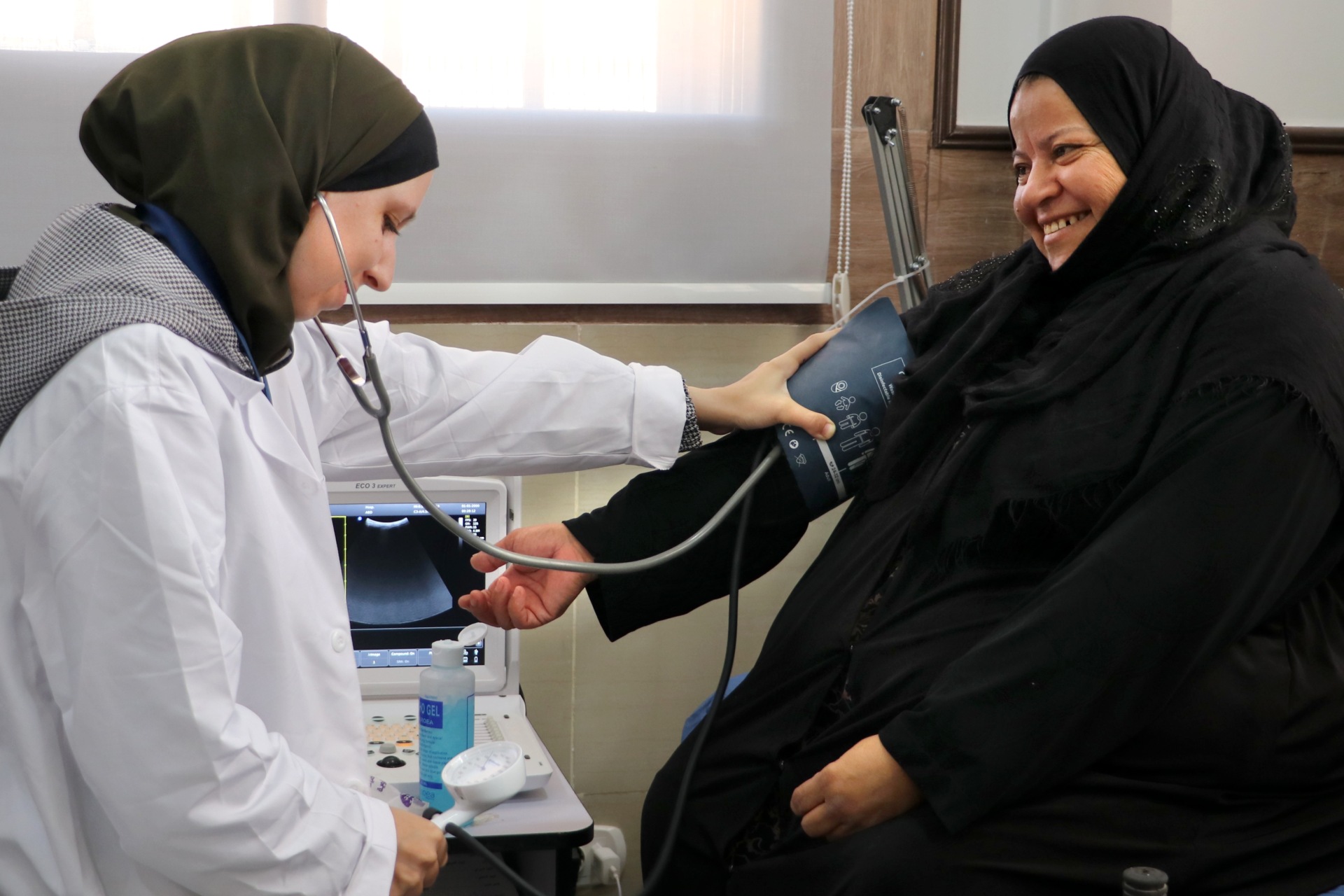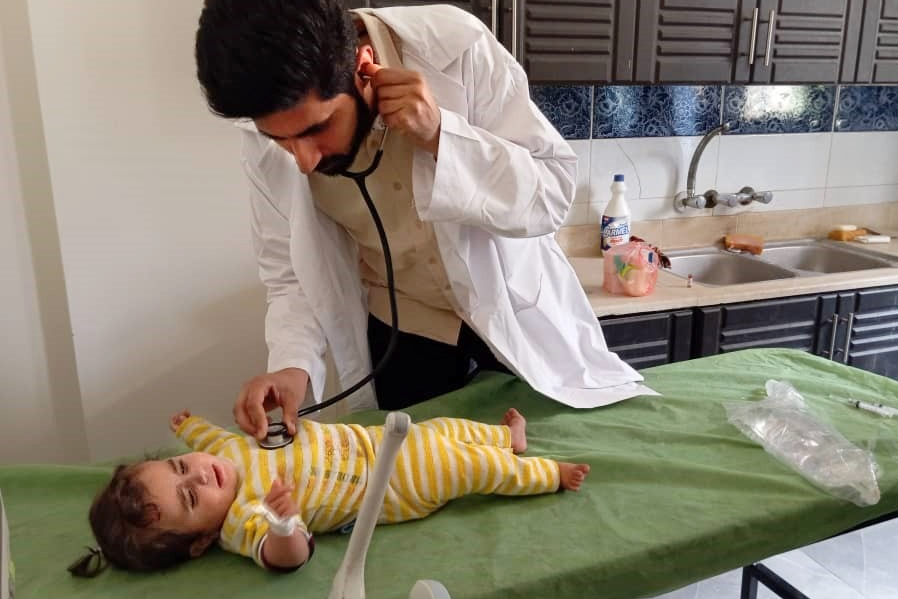More than 16.7 million people in Syria need urgent humanitarian health support. With only 57% of hospitals and 37% of primary health-care centres fully functional, millions are at risk of preventable illness and death. WHO’s partners and donors demonstrate a relentless commitment to provide life-saving help for fragile communities, as they trust WHO to be the actor of choice for making aid and support flow to and reach needy populations, via improved health services.
Donor countries and partners join forces with WHO to strengthen health services
“Reinforcing and strengthening the national health system is critical and WHO has an important role to play.” said ambassador Hilde Haraldstad, Chargée d’Affaires, Norwegian Embassy to Syria. “Support to inclusive health services and system strengthening are priorities for Norwegian assistance to Syria.”
 A health worker checks a patient’s blood pressure at Maskaneh Health Centre in rural Aleppo. The facility delivers primary health care services through a WHO-supported implementing partner, ensuring access to essential care for communities in hard-to-reach areas. Photo by: WHO
A health worker checks a patient’s blood pressure at Maskaneh Health Centre in rural Aleppo. The facility delivers primary health care services through a WHO-supported implementing partner, ensuring access to essential care for communities in hard-to-reach areas. Photo by: WHO
Flexible funding from Norway complements its broader contributions to WHO’s work in emergencies globally. Norway’s annual support to the WHO Contingency Fund for Emergencies (CFE) was used in Syria in December last year, ensuring rapid life-saving interventions for affected communities.
In parallel, Greece has funded WHO’s efforts to deliver essential medicines and medical supplies to health facilities. Millions of Syrians rely on humanitarian assistance, and health facilities experience medicine shortages, rising treatment costs and the impacts of the prolonged conflict. The support from Greece enables WHO to provide critical supplies – including trauma kits, antibiotics and medicines for noncommunicable diseases – reaching areas with the greatest needs.
/strategic-health-operations-(sho)/operations-support-logistics-(osl)/warehouse-check-of-medical-supplies.jpg?sfvrsn=9ce68c01_3) WHO staff prepare medical supplies for delivery to Al-Qamishli in December 2024, supporting health facilities with essential medicines and equipment. Photo by: WHO
WHO staff prepare medical supplies for delivery to Al-Qamishli in December 2024, supporting health facilities with essential medicines and equipment. Photo by: WHO
Medical supplies to ensure critical care for 150 000 people in Idlib
Earlier in June, KSrelief-funded delivery of medical supplies reached the country. It is part of the wider WHO partnership with the King Salman Humanitarian Aid and Relief Centre (KSrelief). To date, KSrelief has pledged US$ 9.49 million through two agreements to WHO, enabling to support lifesaving health services for over 1 million people across Syria. This support funding includes procuring essential primary health-care medicines, covering operational costs for WHO and partners to sustain over 50 health facilities in Aleppo and Idlib, and replacing damaged equipment, including ambulances.
/strategic-health-operations-(sho)/operations-support-logistics-(osl)/bab-al-hawa-border-point-from-turkiye-into-syria.jpg?sfvrsn=7e73f985_5) A truck carrying KSrelief-funded medical supplies crosses the Bab Al-Hawa border point from Türkiye into Syria, ensuring the continued delivery of humanitarian health support. Photo by: WHO
A truck carrying KSrelief-funded medical supplies crosses the Bab Al-Hawa border point from Türkiye into Syria, ensuring the continued delivery of humanitarian health support. Photo by: WHO
/strategic-health-operations-(sho)/operations-support-logistics-(osl)/boxes-of-who-procured-medical-supplies.jpg?sfvrsn=a605dcd9_3) Boxes of WHO-procured medical supplies funded by KSrelief are prepared at the Sarmada warehouse in Idlib. Photo by: WHO
Boxes of WHO-procured medical supplies funded by KSrelief are prepared at the Sarmada warehouse in Idlib. Photo by: WHO
Saving children’s health in Syria’s displacement camps
 Lana sits safely in her father’s arms after recovering from meningitis in Aleppo. Photo by: WHO
Lana sits safely in her father’s arms after recovering from meningitis in Aleppo. Photo by: WHO
Three-year-old Lana has never known life outside of conflict. Born in northern Aleppo after her family fled violence, she has grown up in a crowded displacement camp where families share tents, clean water is scarce, and the risk of disease is high. Earlier this year, she was diagnosed with meningitis – a dangerous infection that can be fatal without urgent treatment. She was hospitalized immediately and for 14 days received intensive care. Lana recovered and was soon ready to return to her tent in the camp, her life no longer under immediate threat.
Lana’s recovery is part of wider efforts to improve health services in the country. With generous funding from the European Civil Protection and Humanitarian Aid Operations (ECHO), WHO and health partners have been supporting Syria’s disease early warning system (known as the Early Warning, Alert and Response Network, or EWARN) – a network of health facilities and laboratories that tracks illnesses, verifies alerts and helps stop outbreaks before they spread.
Emergency care no longer out of reach in rural Deir ez-Zor
In Syria’s rural areas of Deir ez-Zor, access to timely medical care has long been a challenge. For families living in rural towns, reaching the nearest hospital can take hours. But with WHO’s partner and donor support, that gap has begun to close. In coordination with the Deir ez-Zor Directorate of Health and local implementing partner Syria Pulse Association, WHO supported the activation of 2 fully equipped emergency units at Mahkan and Al-Ashara primary health centres.
 Dr Hadi Abdul Rahman Al-Sheikh examines 9-month-old Bayan Al-Darfil at Mahkan Public Health Centre in Deir ez-Zor. Photo by: WHO
Dr Hadi Abdul Rahman Al-Sheikh examines 9-month-old Bayan Al-Darfil at Mahkan Public Health Centre in Deir ez-Zor. Photo by: WHO
Each centre operates with a trained team – including a doctor, nurse, paramedic, driver and support staff – and was equipped with an ambulance, essential medicines and emergency supplies. The centres are also linked to referral hospitals in Deir ez-Zor City and Al-Ashara City, ensuring that patients in need of advanced care could be transported safely and quickly. Whether it’s a burn, a bullet wound, or a sick child – these services have helped communities respond faster, recover sooner and reduce the burden on families.
This emergency health response was made possible thanks to the Syria Humanitarian Fund (SHF) – a multi-donor funding mechanism managed by the United Nations Office for the Coordination of Humanitarian Affairs (OCHA).
Visit the WHO Syria website to find out more:
– Norway's flexible funding to strengthen health services
– Greece partners with WHO across Syria
– How KSrelief helps the country
– How WHO and partners work to strengthen health services in Syria's displacement camps
– Impact of the multi-donor funding mechanism bringing benefits to the rural emergency centres
Acknowledgments
WHO thanks all Member States and other contributors, with special appreciation for those who provide fully flexible contributions to maintain a strong, independent WHO.
This story is about acknowledgment and gratitude to donors who have supported WHO's work in Syria: the European Union (its Centre for Disease Prevention and Control - ECDC, and its Directorate-General for European Civil Protection and Humanitarian Aid Operations - DG-ECHO), the Government of Greece, King Salman Humanitarian Aid and Relief Centre (KS Relief), the Government of Norway, the Syria Humanitarian Fund (SHF) – a multi-donor funding mechanism managed by the United Nations Office for the Coordination of Humanitarian Affairs (OCHA).
The work described was carried in close engagement with the Global Outbreak Alert and Response Network (GOARN) and development partners including Médecins Sans Frontières (MSF) and Africa Centers for Disease Control (Africa CDC).
